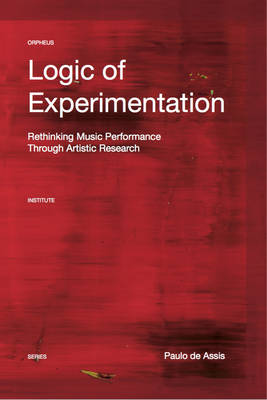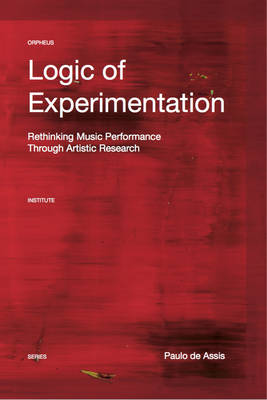
- Retrait gratuit dans votre magasin Club
- 7.000.000 titres dans notre catalogue
- Payer en toute sécurité
- Toujours un magasin près de chez vous
- Retrait gratuit dans votre magasin Club
- 7.000.0000 titres dans notre catalogue
- Payer en toute sécurité
- Toujours un magasin près de chez vous
Logic of Experimentation
Reshaping Music Performance in and Through Artistic Research
Paulo de AssisDescription
Logic of Experimentation offers several innovative and ground-breaking perspectives on music performance, music ontology, research methodologies and ethics of performance. It proposes new modes of thinking and exposing past musical works to contemporary audiences, arguing for a new kind of performer, emancipated from authoritative texts and traditions, whose creativity is propelled by intensive research and inventive imagination. Moving beyond the work-concept, Logic of Experimentation presents a new image of musical works, based upon the notions of strata, assemblage and diagram, advancing innovative practice-based methodologies that integrate archival and musicological research into the creative process leading to a performance. Beyond representational modes of performance--be it mainstream or historically informed performance practices--Logic of Experimentation creates an ontological, methodological and ethical space for experimental performance practices, arguing for a new mode of performance. Written in an experimental style, its eight chapters appropriate music performance concepts from post-structural philosophy, psychoanalysis, science and technology studies, epistemology, and semiotics, displaying how transdisciplinarity is central to artistic research. An indispensable contribution to artistic research in music, Logic of Experimentation is compelling reading for music performers, composers, musicologists, philosophers and artist researchers alike.
Spécifications
Parties prenantes
- Auteur(s) :
- Editeur:
Contenu
- Nombre de pages :
- 300
- Langue:
- Anglais
- Collection :
Caractéristiques
- EAN:
- 9789462701380
- Date de parution :
- 15-11-18
- Format:
- Livre broché
- Format numérique:
- Trade paperback (VS)
- Dimensions :
- 277 mm x 208 mm
- Poids :
- 725 g

Les avis
Nous publions uniquement les avis qui respectent les conditions requises. Consultez nos conditions pour les avis.






